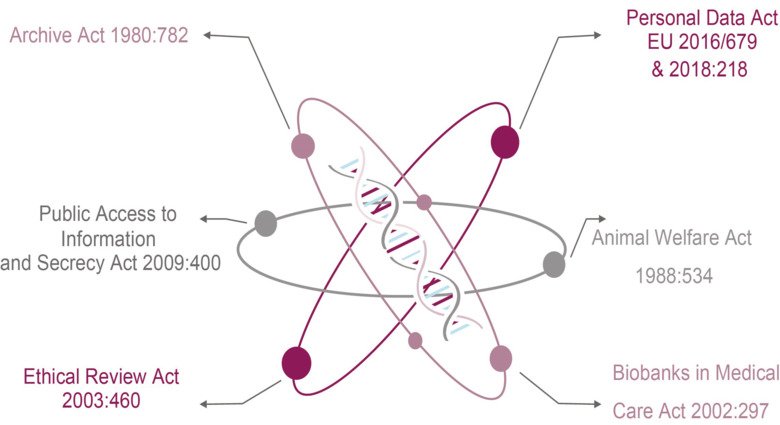Laws and guidelines regulating research documentation
KI research documentation is subject to international and national legislation, and to local legislation.

Laws and Guidelines
The principle of public access means that there is a fundamental right for all citizens to have access to public documents from authorities.
The principle of public access is established in the second chapter of the Press Freedom Act (1949: 105, TF). In the research context, the principle is a basic prerequisite for maintaining public confidence in research.
Research conducted at Karolinska Institute is covered by the principle of public access. As a rule, all research documents become public documents. A document is general if it is stored with an authority and has either been received or drawn up by the authority (TF Chapter 2, § 3, §§ 6-7). A document that has not been finalized can be regarded as a work material and is not yet a public document. A public document must be provided promptly upon request.
Although the principle of public access is the main rule, there are exceptions where the public is not entitled to access certain information. Exceptions are regulated in the Public Access to Information and Secrecy Act (sv. Offentlighets- och sekretesslag (2009:400)) Upon request for access to public documents a confidentiality test is performed. It is only in cases where research data would be covered by confidentiality in accordance with any rule in the Public and Secrecy Act (eg Health and Medical Privacy OSL Chapter 25, Section 1) that Karolinska Institutet can refuse to disclose it. The person who has requested access to the material is then not entitled to this.
Ethical Review Act (sv. Lag (2003:460) om etikprövning av forskning som avser människor)
Are you going to perform studies with research subjects, human tissue or sensitive personal information? If so, an ethics application is required.
An important part of the application concerns the information that is given to the participants in the study. For more information see the human ethics application page
Biobank Act (sv. Lag (2023:38) om biobanker i hälso- och sjukvården m.m.). Documentation relating to biobank samples and biobanking can be divided into two different categories: metadata connected to the samples themselves and biobank agreements connected to the study.
To perform research on biobank samples, the following is required: approved ethics application, research person information with informed consent, approved biobank application, notification of processing of personal data and eventually MTA.
Animal Welfare Act (sv. Djurskyddslag (1988:534))
It is the Swedish Board of Agriculture (Jordbruksverket) which is the supervisory authority for animal studies. At Karolinska Institutet it is important to work actively with the 3 R principle (replace, reduce and refine) when planning animal based research.
The animal ethics permit lasts for a maximum of five (5) years and is also needed for pilot studies. But this is not the only documentation or permit needed for animal based research. It is also necessary to document the numbers of animals used, certificates for education and training and of course the animal records. For an overview of the laws and regulations on animal experimentation you can visit the dedicated webpage from Comparative Medicine. For animal research outside Sweden see https://ki.se/en/comparative-medicine/for-new-researchers/animal-welfare-body-awb/animal-research-outside-the-eu
Also, in some cases export control regulations might be relevant:
Transfer of technology using electronic media (for example via e-mail or via the Internet) to a destination outside the EU is defined as export. Scientific publication as well as oral transmission of technology is also covered by the export control regulations. Export control may be relevant for KI:s researchers in, for example, international research projects where it is important that the responsibility for possible export licenses are regulated in the agreements. Another example is when KI employees participate in international conferences. Anyone who exports products and/or technology from the country is obliged to find out if these are classified as dual-use items. Even if a license is not required for transfer within the EU, there is an obligation to provide information if it concerns dual-use items. For more information see https://staff.ki.se/export-control-of-dual-use-items
KI Guidelines for research documentation valid from 2021-01-26.
Research should be conducted in accordance with the general rules of good research practice, for example:
- Integrity - researchers should work with honesty and respect, and strive to eliminate fraud and misconduct.
- Transparency - research should be as open as possible (without violating individual privacy, intellectual property, laws and regulations).
- Policy and legislation - all researchers must be aware of the legal requirements for their research and the general rules and guidelines in their respective fields.
- Ownership and use - should be clarified from the beginning (especially important in collaborative projects), both for the project and for future research. Proper documentation of the research is important.
- Distribution and publication of results - not only in academia but also for the general public (the so-called "third mission", sv. Tredje uppgiften).
- Ethical practices in research involving humans and other animals - rules must be followed. This includes the necessary approvals of the relevant ethics committees prior to the start of the research project.
Additional laws, guidelines, and ethics codes regulating research, with potential impact on research documentation, are collected at the Codex page.
Contact Research data office
If you have questions regarding research data management please contact rdo@ki.se
